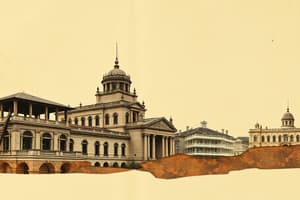Podcast
Questions and Answers
What is the primary purpose of Araling Panlipunan?
What is the primary purpose of Araling Panlipunan?
- To provide entertainment through cultural festivals
- To enhance physical education in schools
- To develop informed and responsible citizens (correct)
- To focus exclusively on local history
What major historical themes are examined in the Araling Panlipunan curriculum?
What major historical themes are examined in the Araling Panlipunan curriculum?
- The influence of Western literature
- Cultural festivals and entertainment properties
- Pre-colonial society and the impact of colonization (correct)
- The history of global sports events
Which factor is NOT covered in the geography component of Araling Panlipunan?
Which factor is NOT covered in the geography component of Araling Panlipunan?
- Natural disasters and their community impact
- Population density of the Philippines
- The history of global exploration (correct)
- The climate affecting the economy
Which economic concept is explored in the economics component of Araling Panlipunan?
Which economic concept is explored in the economics component of Araling Panlipunan?
What does the civics component of Araling Panlipunan emphasize?
What does the civics component of Araling Panlipunan emphasize?
Which topic is relevant to the cultural diversity aspect of Araling Panlipunan?
Which topic is relevant to the cultural diversity aspect of Araling Panlipunan?
What major issue is analyzed within the economics component?
What major issue is analyzed within the economics component?
Which element is NOT a focus of the geography component in Araling Panlipunan?
Which element is NOT a focus of the geography component in Araling Panlipunan?
Flashcards
What is Araling Panlipunan?
What is Araling Panlipunan?
Araling Panlipunan is a Filipino subject that combines various disciplines, like history, geography, economics, and civics, to educate students about their society and how to be responsible citizens.
What does the history component focus on?
What does the history component focus on?
The history component of Araling Panlipunan examines the Philippines' journey from before colonization to the present, including important events like revolutions and nation-building.
What does the geography component explore?
What does the geography component explore?
The geography component delves into the Philippines' physical features, including its islands, bodies of water, and diverse ecosystems, as well as their impact on the environment and culture.
What does the economics component cover?
What does the economics component cover?
Signup and view all the flashcards
What does the civics component emphasize?
What does the civics component emphasize?
Signup and view all the flashcards
What is another important topic in Araling Panlipunan?
What is another important topic in Araling Panlipunan?
Signup and view all the flashcards
What is the overall goal of Araling Panlipunan?
What is the overall goal of Araling Panlipunan?
Signup and view all the flashcards
How does the curriculum approach teaching?
How does the curriculum approach teaching?
Signup and view all the flashcards
Study Notes
Introduction to Araling Panlipunan
- Araling Panlipunan is a Filipino social studies subject.
- It encompasses various disciplines, including history, geography, economics, and civics.
- It aims to develop informed and responsible citizens.
- The curriculum often incorporates local and global perspectives.
- It explores current issues like social justice, environmental concerns, and political discourse.
History Component
- Covers the development of Philippine society from pre-colonial times to the present.
- Examines various historical periods and events, including colonization, revolutions, and nation-building.
- Analyzes different socio-political movements and their impact on the nation.
- Includes significant figures and roles played in Philippine history.
- Emphasis on primary and secondary source utilization for historical analysis.
Geography Component
- Focuses on the geographic features of the Philippines, including its islands, bodies of water, and ecosystems.
- Explores the diverse landscapes and climates affecting the nation's environment.
- Covers concepts like population density, resource distribution, and environmental challenges.
- Explores geographical factors influencing Philippine culture and economy.
- Includes analyses of natural disasters and their impact on communities.
Economics Component
- Introduces basic economic principles and concepts.
- Explores the Philippine economy's structure and performance.
- Examines economic systems, trade, globalization, and development.
- Analyzes economic inequalities and disparities.
- Explores factors contributing to poverty, economic growth, and sustainable development.
Civics Component
- Covers the Philippine political system, including its government structure, roles, and functions.
- Explores the importance of civic engagement and participation in decision-making.
- Focuses on constitutional rights, duties, responsibilities, and legislative processes.
- Introduces concepts of human rights, democracy, and the rule of law.
- Includes case studies and current events to demonstrate the application of these concepts.
Other Relevant Topics
- Cultural diversity within the Philippines and its impact on national identity.
- Examines different cultures and their unique traditions, values, and practices.
- Includes analyses of cultural exchange and conflict.
- Explores the different languages spoken in the Philippines, recognizing linguistic diversity.
- Includes discussions on regional variations in social norms and traditions.
- The study of contemporary issues like poverty, inequality, environmental degradation, and social injustice.
- Exploration of ongoing conflicts and their effect on local societies.
- Examining societal changes and their influence on historical and social contexts.
- Understanding social justice issues and the role of government in ensuring equity.
- Analysis of ethical dilemmas and their implications for society.
Studying That Suits You
Use AI to generate personalized quizzes and flashcards to suit your learning preferences.




